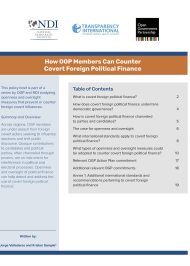
Across the world, foreign covert actors are seeking to influence elections and shift public discourse. Opaque contributions to candidates and political parties are an instrument of interference in political and electoral processes.
Covert foreign political finance is defined as “the funding of foreign political parties, candidates, campaigns, well-connected elites or politically influential groups, often through non-transparent structures designed to obfuscate ties to a nation state or its proxies.” The types of campaigns targeted by covert foreign donors can include both elections and direct democracy processes such as referendums or initiatives.
There is as yet no global consensus on an optimal political finance model; countries around the world vary greatly in terms of the degree of regulation on key aspects including spending levels, donation limits and reporting procedures. However, what is broadly agreed upon is the concern regarding the dangers of foreign-sponsored political finance. Currently 70 per cent of nations around the world ban foreign-interest donations to political parties.
Covert foreign political finance is rarely channeled in the form of a direct bank transfer. Three commonly used categories of in-kind contributions have been recognised by researchers so far:
- tangible benefits, such as financial loans or expensive gifts
- media services like tailor-made social media manipulation
- valuable information like opposition research
This policy brief by Transparency International, National Democratic Institute and Open Government Partnership explores how openness and oversight of political finance can help detect and address the use of covert foreign political influence.




